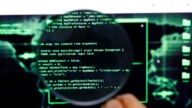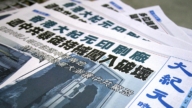【新唐人2014年11月24日讯】美国国家安全局局长兼网战司令部司令最近说,世界上只有中国和“一两个其他国家”,有能力对美国发动关闭电网和其它关键系统的网络攻击,并且他们迟早会这样做。那么,中共到底有多大可能对美国发动网络战争?请看报导。
据英国广播公司《BBC》报导,在11月20号的众议院听证会上,美国国家安全局局长、网络司令部司令迈克尔•罗杰斯(Michael Rogers)表示,中国和“一或两个”其它国家能够发动网络攻击,切断美国部分地区的电网。但他拒绝点出这“一两个其它国家”的名字。
罗杰斯还表示,美国的敌人正在进行定期性电子侦察,可以对例如化学设施和水处理厂的工业控制系统发起攻击。
报导说,此前有私营公司提供的一份报告声称,美国的电网和其它关键系统,被来自中国的骇客入侵,似乎预示着可能的攻击行动。
罗杰斯说,“所有这些都使得我相信,这只是时间问题,我们将会看到令人震惊的事件发生。”
以前很多人认为,美国有可能会遭到对手的这类网络攻击,但美国最高网战指挥官公开证实这样的可能,还是首次。
澳大利亚《悉尼时报》总经理兼副总编辑、时事评论家杨恒均:“作为一个军方的司令,他有他的道理,他可能想预算。另外作为军人,他肯定要做最坏的打算。中美之间目前来讲,各方面还没有说真正那么和谐,争吵到战争,这都有可能存在。”
澳大利亚《悉尼时报》总经理兼副总编辑、时事评论家杨恒均表示,到目前为止,中共从网络技术和集中的国家力量上,具备了打网络战的能力。罗杰斯讲的是有道理的。
杨恒均:“虽然这两个国家的领导人不停的握手、不停的密谈,但是我觉得最重要的是,在这种大国的意识形态对国际格局看法上还存在很大问题。我觉得,他们全面对抗、甚至再出现某种程度的冷战还是可能的。”
杨恒均还表示,中共在20年前就说超限战,所以,他们发展网络间谍、搞网络情报不遗余力。当然,他们这样做,也会招致其它国家的反击。
前雅虎中国总经理谢文指出,关闭电网和对关键系统的攻击行为,那就意味着全面战争。但谢文认为,目前美中两国全面战争的可能性并不大,罗杰斯的说法更像是为增加预算的说辞。
前雅虎中国总经理谢文:“如果说有这种情况的话,美国的网络战上的能力比中国应该高100倍。应该没有谁傻到向美国进行网络战。”
美国对于全球的网络监控有着无可比拟的优势。目前,全球有13台域名根服务器,1台主根服务器设在美国,其余12台副根服务器有9台设也在美国,其余3台分别在英国、瑞典和日本。
有香港媒体分析,理论上,美国随时可以通过在网络中清除所有中国域名,把中共“打回石器时代”。
实际上,其它国家不断指控中共在网络上的间谍行为。
今年5月,美国司法部以网络间谍罪起诉了中共五名军方人员﹔近日台湾安全局的书面报告也说,中共有网军18万人,仅去年对台湾机密单位的攻击就达到了700多万次,恶意行为有23万多次。
台湾安全局还指出,中共网络战是由总参各部、7大军区、国防科研机关和各级院校进行任务分工,平时负责网络窃密和渗透、作战时负责网络攻击。此外,他们还暗中扶植民间骇客组织从事间谍活动、研发各类的恶意应用程序窃取敏感资讯等。
杨恒均表示,中共18大之后最早成立的三个领导小组,其中一个就是网络领导小组,可见中共对网络的重视程度。因此,杨恒均认为,台湾遭到的攻击可能超出台湾当局公布的数据。
采访/秦雪 编辑/宋风 后制/舒灿
U.S. Cyber Command: CCP Will Start a Cyber War Sooner or Later
Adm. Michael Rogers, director of the National Security Agency
and head of U.S. Cyber Command, recently made a comment
that China and “one or two" other countries have the power
to shut down the U.S. electric grid with cyber attacks.
Something dramatic will happen and it’s only a matter of when.
Then what is the possibilty of the CCP starting
a cyber war with the U.S?
Please read the report.
As reported by the BBC, on Nov 20, at a hearing of the
House Intelligence Committee, Michael Rogers told the
lawmakers that “one or two" other countries are capable of
mounting cyber attacks that would shut down the electric grid
and other critical systems in parts of the United States.
Rogers didn’t name the other “one or two" countries.
Rogers also said that U.S. adversaries are performing electronic
“reconnaissance" on a regular basis so that they can be in a
position to disrupt the industrial control systems that run
everything from chemical facilities to water treatment plants.
The report also mentioned a private report that detailed how
China-based intrusions got into into the power grid and
other critical systems. It seemed a precursor to further attacks.
Rogers said: “All of that leads me to believe it is only a matter
of when, not if, we are going to see something dramatic."
People suspect that the United States might be subject
to cyber attacks from its adversaries.
However, it’s the first time that top officials from the
National Security Agency proved the possibilities in public.
Yang Hengjun, MD and Associate Chief Editor of “Sydney Times",
said: ‘As the director of the National Security Agency,
Rogers has his reasoning and strategic plan.
He might be planning for the worst.
The relationship between China and U.S. in all aspects
isn’t that harmonious yet.
The two countries argue over discrepancies and
wars are not totally impossible. “
Yang Hengjun said that CCP technology and centralized power
make it possible to carry out cyberattacks.
Rogers’ comments make sense in a certain way.
Yang Hengjun: “Even if the leaders of those two countries
keep shaking each other’s hands and having confidential talks,
nonetheless, I think they hold very different views on ideologies
and internal situations. I think it’s possible they resist each other
or carry out a ‘cold war’."
Yang Hengjun also stated that the CCP talked about
“above limit" wars. Therefore, the party cultivates internet spies
and concentrates on the collection of internet secret information.
Of course, other countries are sick of what the party does.
Xie Wen, former Yahoo General Manager in China,
said that maliciously shutting down the electric grid
and other critical systems means a full-scale war.
But Xie thinks that it’s not possible that a full-scale war
will take place between China and the U.S.
He thinks that Rogers made the argument to increase
the corresponding budget.
Xie Wen:"If it happens, the technology potency of the U.S.
is a 100 times stronger than that of China.
China wouldn’t be so silly as to challenge the U.S."
The U.S. has absolute advantage in global internet monitoring.
Right now, there are 13 domain name root servers.
One main server is located in the U.S., 9 out of the other 12
associated servers are also located in the States.
The other 3 associate servers are located in Britain,
Sweden and Japan respectively.
Hong Kong media reported that theoretically the U.S.
can remove China’s domain name anytime and the CCP
would have to go back to “primordial time".
In actuality, other countries keep accusing the CCP of
internet spying behaviors.
This May, the Ministry of Justice of the U.S.
prosecuted 5 CCP military members.
Recently, Taiwan National Security Station reported that
the CCP recruits an internet army of 180,000 people.
CCP attacked Taiwan confidential structures more than
7 million times last year, including 230,000 malicious attacks.
Taiwan National Security Station also pointed out that the CCP
divides the tasks among different departments of General Staff,
7 military bases, national security research and even colleges.
Every day, they work on stealing confidential information and
influencing public opinion. They carry out internet assaults
when needed. Moreover, they also cultivate hackers and spies
from ordinary people. They develop all kinds of malicious
applications and steal sensitive information.
Yang Hengjun said that 3 groups were formed after the party’s
18th National Congress. One of the groups is in charge of internet.
One can see CCP does take the internet very seriously.
Therefore, the assaults that Taiwan has suffered could be
a lot more than the published statistics.
Interview/QinXue Edit/SongFeng Post-Production/ShuCan




























